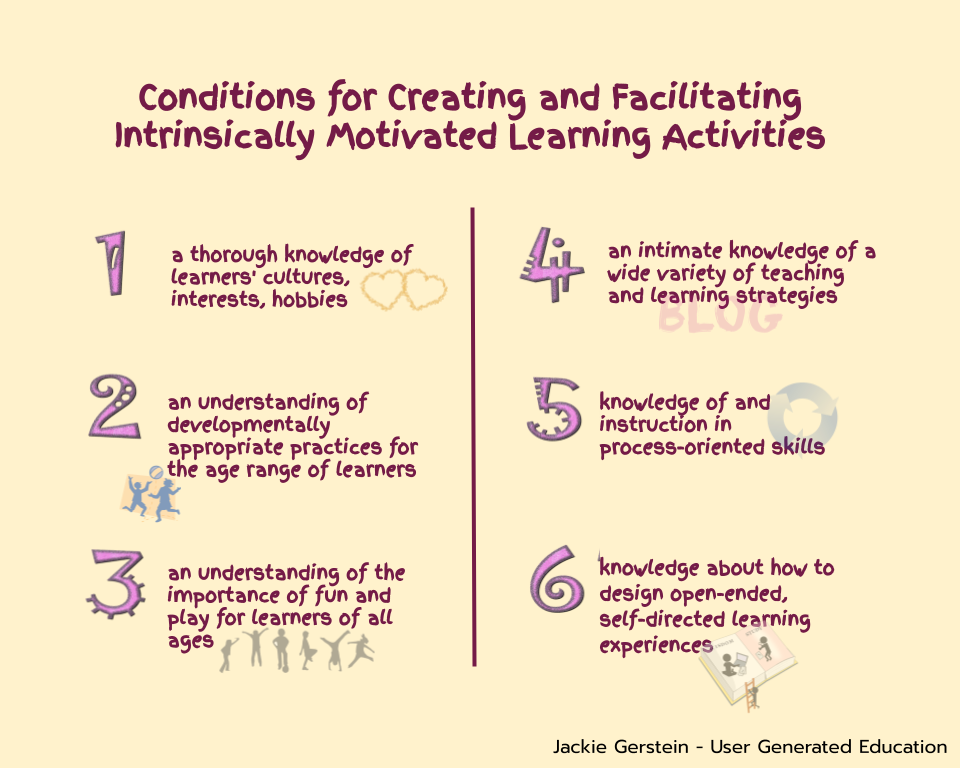Posts Tagged ‘intrinsic motivation’
Choosing Not to Grade Student Work
I wear many hats as an educator. I teach graduate courses in education and counseling. I am a seminar facilitator for student teachers, and I teach gifted education at three Title 1 elementary schools. I have said for decades that I love teaching but I hate grading. It puts me in a power position over students which is, for me, contrary to my teaching philosophy of creating a learning community where we all become teachers and learners. Achieving this goal becomes more difficult when I am the grader-in-chief. For the graduate courses, I still am the grader-in-chief. I haven’t figured out a way around this as I am part of systems of universities where this is a deeply embedded practice. (Although Jesse Stommel does ungrading in higher education – see How to Ungrade). As for my other hats, cohort facilitator and gifted education teacher, I do not have to grade and am grateful for that. I intentionally selected public education jobs, PE teacher in the past and now a gifted education teacher, where I wouldn’t have to give them grades; where I wouldn’t have to give them standardized tests.
Across education, we’ve normalized absurd levels of grading, test-taking, and standardized assessment. Without much critical examination, teachers accept they have to grade, students accept they have to be graded, students are made to feel like they should care a great deal about grades, and teachers are told they shouldn’t spend much time thinking about the why, when, and whether of grades. Obedience to a system of crude ranking is crafted to feel altruistic, because it’s supposedly fair, saves time, and helps prepare students for the horrors of the “real world.” Conscientious objection is made to seem impossible (Jesse Stommel How to Ungrade).
Without the pressure of being graded, students don’t ask the typical questions such as, “Do I have to know this for the test?”, “How many pages does the paper need to be?”, “Do I need to use references? If so, how many?” Without the pressure of being graded, learners will be more willing to take risks, try new things, and be more creative and more innovative.
Without the “threat” of a grade, an extrinsic form of rewards and punishment, there is more pressure on the educator to create learning activities that are highly engaging and intrinsically rewarding for their learners. (Disclaimer: Even if students are getting a grade, I believe their work should be intrinsically motivated.) To do so, several conditions or pre-requisites need to be present:
- A thorough knowledge of learners’ cultures, interests, hobbies;
- An understanding of developmental appropriate practices for the age-range of learners;
- An understanding of the importance of fun and play for learners of all ages;
- An intimate knowledge of a wide variety of instructional strategies including, but not limited to, hands-on/minds-on learning; creating multimedia like videos and podcasts; the design thinking process;
- Knowledge of and instruction in process-oriented skills including, but not limited to, learners asking their own essential questions; the iterative process; researching skills; communicating with others; critical thinking and problem solving skills;
- Knowledge about how to design open-ended, self-directed learning experiences.
The results of not grading and designing intrinsically motivated learning activities can be heard in the spontaneous comments made by learners. This qualitative information, for me as an educator, is a much better measure of success in the classroom than any type of quantitative information. What follows are some comments I love hearing from my learners:
- I really like coming to class.
- Can I stay in the classroom (for recess, for lunch, after school) so I can continue working on my project?
- Is it time to go leave already?
- I am a good learner.
- I love learning new things.
- I feel like I have a real voice in this classroom; that what I say matters.
- I know I wasn’t successful with the assignment but I am going to use that information to improve.
- Our class feels like a family.
- You (the teacher) haven’t forgotten what it’s like to be a kid.


